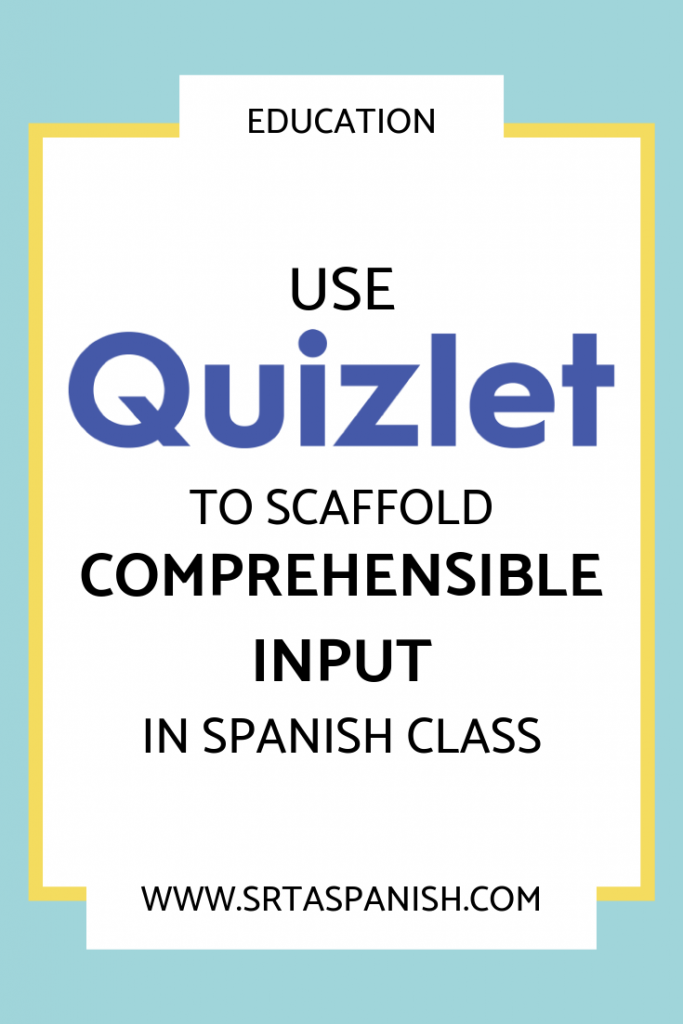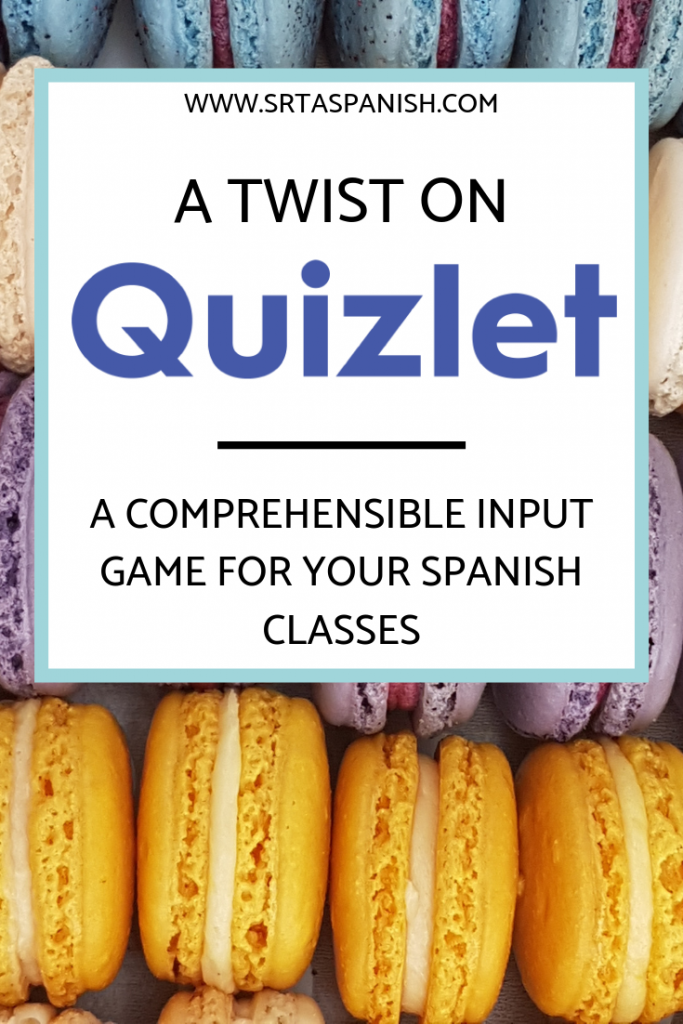I LOVE using the game Head’s Up. And Catch Phrase. Really, any game like those in my classroom. I bet you do too – they’re great for teaching circumlocution skills. Unfortunately, sometimes my students aren’t quite ready for the amount of output those games really need to play well. Sometimes, they just need some more modeling for ideas of how to play. So, here are two ways that I tweaked those games to be similar for my classroom, but with a little more help than usual.

“Adivina”
For this game, I created a Quizlet set of clues that went with our vocab words. I tried to keep them short and sweet, very simple to understand for any level student.
Then, it was time for the setup. It was a little bit of a process, but not too bad! Each group only needed one device. I had a (chosen) student go to the Quizlet set, choose flashcards, and set it to be playing the clue. The students read the clue out loud to their group, and the other people tried to guess. This is really good listening practice for them! The reader could check whether they were right or wrong by clicking the card to see the answer. I encouraged them to try and come up with more hints if their group was stuck. Once they got the hang of it, we played for a few rounds, then tried a ‘bonus’ round – each time their group guessed one correctly, they added a star to the card. Then, at the end of the time, we shared how many stars each group had earned.
Here are the slides I used to play this game! Feel free to make a copy and use with your own students – they’re currently linking to the Quizlet set from En Español 2:1-3, but you can change it to whatever set you want.
Quizlet.live
This one is even simpler than the last one. I got a little smarter between chapters 1-3 and 2-1, and figured, hey! Why am I writing all of these clues? The students had a warm up one day to choose 10 vocab words and write “Head’s Up style clues” for each of those words in Spanish. Basically – describe the word, without using the word (more circumlocution practice, anyone?). Then I had 840 clues to choose from. A lot of them chose the same words, but there was enough variety in there to get a set of 50 words and clues created! I edited them for accuracy while creating the set, but it was a lot easier than coming up with the clues on my own, AND they had extra circumlocution practice.
The rest was easy-peesy. I chose definition and term during the set up of Quizlet.live, so the students saw the clue on the top, and chose from a list of vocab words.
They worked together and read the clues out loud, processing the information. It was definitely a lot slower than English-Spanish Quizlet.live rounds, but there was also a lot more language going on. The students said it was challenging, but because of how Quizlet.live reacts to wrong answers (it boots your team back to zero points!) they were being really slow and careful in their answers, and reading things really closely.
Here’s the link to the set I built using student-created clues.
Reflection

The extra nice thing about this is that Quizlet sets are so easily printed and formatted. You could make the sets, and turn them into matching games if you wanted to cut things apart for a good vocab station, or the students could practice on their own with all of the options Quizlet has to offer. Now that I’ve tried a few ways, I keep thinking about how else we could do this. Anyone else have any ideas?
Do you love Quizlet too? Here are a few other ways to use Quizlet.live in your class!


Nice. I do the same tyoes if ganes with q and a… ie: where do you live? I live in NY. What color are your eyes. My eyes are blue. Are your eyes black? No, my eyes are blue… and so on. Kids do take their time. I love the collaborative aspect.
Another fun game with Quizlet, from their suggestions… play a straight team game… then, the winning team only play each other with each of the 4 having 4 computers. It’s tricky to set up at first. The rest of the class is so quiet watching the 4. Super intense. Thanks for your ideas.
I love the idea with the bonus round! Thanks for sharing 🙂
Great ideas! Thank you for sharing!
You’re welcome! I hope your students enjoy the activity!!
Thanks for sharing. Gotta love Quizlet! Be sure you set the language to Spanish on your flash cards. The set you linked pronounced “un verbo, lo opuesto de vivir” with English phonetics. ¡Uf! Otherwise, good takeaways. Gracias.
That’s good to know! I have my students read the cards out loud so we don’t listen to the computer reading them. I forget that you can have Quizlet read with different languages! Thanks for the reminder!
Thanks for sharing! I am so glad I tripped across your post. This has been something I have been meaning to try with my novice students, but I have been trying to figure out a structured way to make this attainable and appropriate for a novice course. I also like your idea of having the students come up with the clues! Speaking of structured games for the WL class, I recently posted on the game of Scattergories:http://teachinginthetargetlanguage.com/scattergories-one-of-our-favorite-childhood-games-in-the-world-language-class/. If anyone is looking for something fun and different (and of course, structured), check out this activity! Thanks again for sharing your ideas! I am looking forward to trying these out with my students! 🙂
Thanks for the idea!! already created to sets:Preliminary lesson and Unit Les 1!